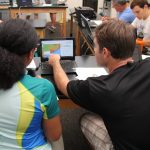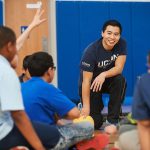An interdisciplinary group of UConn researchers is leading an effort to empower high school students to become “Eco-Digital” storytellers in their communities.
Patricia “Pat” Jepson’s history with UConn spans several decades – from her time as a high school student to her retirement in 2017. Throughout her career, Jepson worked to promote excellence and diversity in Connecticut’s agricultural education programs – a commitment she maintains even now. As a student at Wilson High School (now Middletown High School), Jepson was involved in her school’s agriculture program and took UConn co-op credits. Jepson, a first-generation college student, went on to study animal science at UConn.
When Linda Pescatello began her career as an exercise science researcher, the field was a marginal part of the medical sciences. Over the course of her decades-long commitment to continual learning and research, Pescatello’s work has risen to prominence, making her an internationally recognized expert in exercise prescription and post-exercise hypotension.
Two long-running educational programs at UConn for Supplemental Nutrition Assistant Program (SNAP) recipients are combining under a new $4.2 million USDA grant. Neag School Professor Jennifer McGarry in the Department of Educational Leadership and executive director of Husky Sport is the PI on this grant.
Neag School of Education professor of science education Todd Campbell is working on two grants focused on expanding the diversity and accessibility of science education in Connecticut and beyond. The first grant is funded through a $1.5 million National Science Foundation grant. The project will develop and implement a unit on the science of COVID-19 through a social justice lens, while also supporting groups of teachers to develop, test, and refine justice-centered instructional practices in local schools.
Lisa Sanetti is testing the efficacy of PRIME, a system designed to combat the implementation challenges behavioral interventions face in elementary classrooms.
Glenn Mitoma understands that questions of human rights require careful inquiry and extensive collaboration. His work aims to increase the realization of human rights through education and community programs.
Allison Lombardi, associate professor of educational psychology in the Neag School of Education, was recently awarded two grants supporting college and career readiness for students with disabilities from the Institute of Educational Sciences within the U.S. Department of Education. Together, the two new awards total more than $1.2 million.
A group of UConn researchers have received a $2.5 million grant from the National Institutes of Health (NIH) to develop a network to address knowledge gaps on the topic of emotional well-being, an emerging public health concern. This project is one of six, totaling more than $3.13 million in year one funding from the NIH.
As the world of science, technology, engineering, and math (STEM) becomes increasingly computational, promoting students’ computational thinking is essential to prepare them for future STEM careers. Neag School of Education assistant professor of learning sciences, Ido Davidesco, has received a $1.4 million grant from the National Science Foundation (NSF) to develop a month-long computational thinking unit in high school biology classes.










